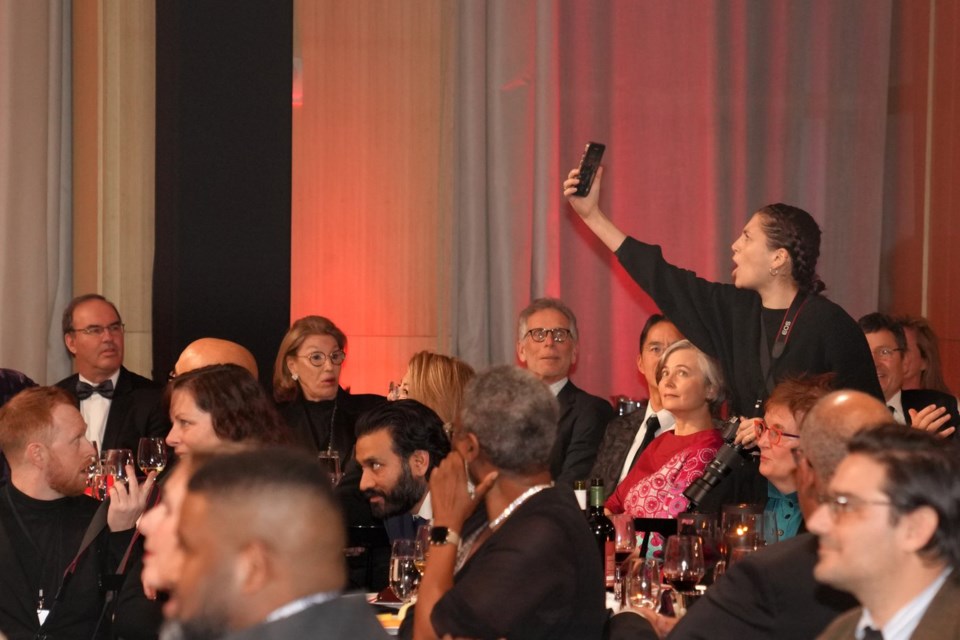TORONTO — The group of authors in contention for this year’s $100,000 Giller Prize has been whittled down to 12, but one name is notably absent from the list: Scotiabank.
The big bank remains the lead sponsor of the award, but its name has been removed from the prize title, Elana Rabinovitch, executive director of the Giller Foundation said Wednesday.
The rebranding comes after protesters disrupted 2023's ceremony to decry the bank’s investment in an Israeli weapons manufacturer.
"Ultimately, more than ever, we want to ensure the prize stays true to its purpose: to celebrate the best in Canadian fiction and to give the stage to Canada’s best storytellers," Rabinovitch said in an email. "For us, that means ensuring the focus remains solely on the prize and the art itself."
In the months since last year’s protest, members of the literary community have pushed for the Giller Foundation to end its 20-year partnership with Scotiabank, as well as financial relationships with other sponsors they say have ties to Israel's army.
That includes Indigo, whose CEO Heather Reisman is the founder of Hesig Foundation, which offers funding to so-called lone soldiers — people who join the Israeli Defense Forces despite not having family in the country.
The two international judges on this year’s five-member jury resigned from their positions in July and numerous authors – including past prize contenders – withdrew their names from consideration for the award.
Jody Chan, a poet and organizer with CanLit Responds, the group issuing the calls to the Giller, said removing Scotiabank's name from the prize does not address the writers' concerns.
"It's very in line with how the Giller has been responding to authors over the past many months, trying to ride out the bad publicity and sweeping authors' demands under the rug instead of directly responding to them," they said.
Chan added that while Rabinovitch said the focus should be on the authors and their art, the writers who signed a joint letter to the Giller Foundation want people to focus on the 40,000 Palestinians killed in Israel's attack on Gaza.
Likewise, Avik Jain Chatlani, author of "This Country is No Longer Yours" and a signatory of the letter, said focusing on art is not inherently virtuous.
"Art is like exercise. You can do it; it can make you feel better; it's good for you. It doesn't necessarily make you more decent," he said.
Caring about other people is what makes you more decent, and by continuing to accept funding from organizations with financial ties to the Israeli army, the Giller is failing in that regard, he said.
While Jain Chatlani doesn't expect the Giller Foundation to do anything more to address concerns, he hopes the longlisted authors will withdraw their names from consideration.
This year’s long list includes British Columbia authors Anne Fleming for her novel “Curiosities” and Loghan Paylor for their novel “The Cure for Drowning,” both of which deal with questions of gender and sexuality in eras when those conversations were much less common.
Gender themes feature prominently on the long list, and only two of the 12 finalists are men.
They are Montreal's Éric Chacour for his novel “What I Know About You,” which was translated from the original French, and Edmonton's Conor Kerr for his novel “Prairie Edge.”
Also in contention are Toronto poet Anne Michaels for her novel “Held,” Toronto-based Deepa Rajagopalan for her short story collection “Peacocks of Instagram,” Vancouver-based Caroline Adderson for her short story collection “A Way to Be Happy” and B.C.-based Shashi Bhat for her collection “Death by a Thousand Cuts.”
Rounding out the list are Kelowna, B.C.'s Corinna Chong for her novel “Bad Land,” Massachusetts-based Claire Messud for the novel “This Strange Eventful History,” Ontario's Jane Urquhart for her novel “In Winter I Get Up at Night” and Winnipeg's katherena vermette for her novel “real ones.”
Though several dozen authors said they had directed their publishers not to submit their works for the prize, the Giller Foundation said Wednesday the three remaining jury members picked from 112 submissions – on par with 2017 and more than 2018.
The number is, however, down from last year and the year before – a change the foundation attributes to a backlog of book publications in the wake of the COVID-19 pandemic.
It's unclear whether any of the writers who signed the letter were submitted for consideration, as publishers can put forward only a limited number of works each year.
The Giller Prize ceremony is set for Nov. 18 and will be broadcast on CBC TV and CBC Gem.
This report by The Canadian Press was first published Sept. 4, 2024.
Nicole Thompson, The Canadian Press

